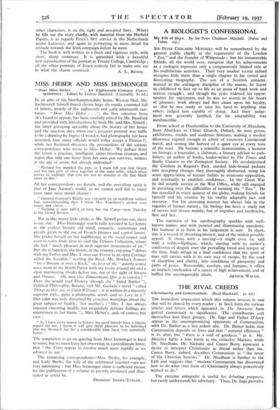A BIOLOGIST'S CONFESSIONAL
SIR PL MR CHALMERS MITCHELL will be remembered by the general public chiefly as the regenerator of the London "Zoo," and the founder of Whipsnade ; but his innumerable friends, all the world over, recognise that his achievements as a zoologist represent only a comparatively limited side of his multifarious activities. Their very modest recital indeed occupies little more than a single chapter in his varied and fascinating biography. The son of a Scottish. minister, trained in the astringent discipline of the manse, he learnt in childhood to face up to life as an arena of hard work and serious struggle ; and though the years widened his oppor- tunities for enjoyment, and he was no ascetic in his hours of pleasure, work always had first claim upon his loyalty, so that he was ready to turn his hand to anything that others judged him capable of doing. And their judge- ment was generally justified, for his adaptability was inexhaustible.
From school at Dunfermline to the University of Aberdeen, from Aberdeen to Christ Church, Oxford, he won prizes, exhibitions, medals and academic honours, making a modest allowance expand enough to admit of extensive Continental travel, and storing the harvest of a quiet eye at every turn of the road. He became a scientific demonstrator, a lecturer on biology, a journalist, a clubman, a literary adviser to pub- lishers, an author of books, leader-writer to The Times, and finally Curator to the Zoological Society. He revolutionised the Gardens in Regent's Park, startled hide-bound pedants into accepting changes they thoroughly distrusted, using his acute appreciation of human foibles to overcome opposition, and eventually to establish confidence. In the Great War he did notable service at the War Office, while still engaged in presiding over the difficulties of running the "Zoo." He has travelled in every quarter of the globe, making friends for himself and his country by his swiftly adaptable tact and resource. For his crowning interest his always lain in the vagaries of human nature ; his biology has been a study not of nerves and tissues mainly, but of impulses and tendencies, first and last.
The narrative of his autobiography sparkles with well- known names, and with pointed and illuminating anecdotes. His humour is as fresh as his judgement is sure. In short, this is a record of absorbing interest, and of the widest possible appeal. It closes with a moving—it might even be said with a noble—Epilogue, which, starting with its author's confession of despair over the prevailing trend and temper of the time, finds refuge in a final confidence that the spirit of man still carries with it its own way of escape, by the road of discipline and charity, into conditions of prosperity and paths of peace. Reasonable, resolute, and humane, it offers an implicit vindication of a career of high achievement, and of
baffled but unconquerable ideals. ARTHUR WAUGH.














































 Previous page
Previous page